

Lire un livre en moins de 90 minutes grâce à cette nouvelle technologie. Sans nul doute, la technologie de lecture diffusée par Spritz confirmera son statut de petite révolution sous peu.
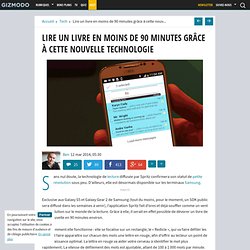
D’ailleurs, elle est désormais disponible sur les terminaux Samsung. Le smartphone modulaire : une évolution inévitable. Imaginez un monde dans lequel vous n’avez plus à renouveler votre smartphone.

A la place, il suffira de remplacer des modules APN, processeurs ou scanneur d’empreintes. Marry me [through Google Glass] Les tablettes s'invitent dans les foyers français. Why Big Tech Companies Are Going After Smart Watches. After two years of seeing smaller companies dabble with smart watches, the big tech companies have decided it's time to enter the market.
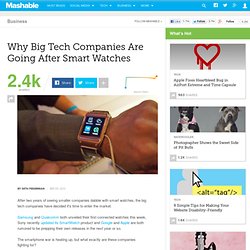
Samsung and Qualcomm both unveiled their first connected watches this week, Sony recently updated its SmartWatch product and Google and Apple are both rumored to be prepping their own releases in the next year or so. The smartphone war is heating up, but what exactly are these companies fighting for? Until now, smart watch shipments have been negligible, to say the least. Most analysts we spoke with only started tracking the market recently and estimate that units are currently measured in the thousands per month. But the expectation is that the market will explode in the next five years. Jeff Orr, a mobile industry analyst with ABI Research, estimates that there will be 1.2 million smart watch shipments worldwide this year, 7 million in 2014 and 140 million in 2018. How Will Wearable Tech Impact the Startup World? Products like Google Glass and Nike+ FuelBand hint at the future of wearable technology.
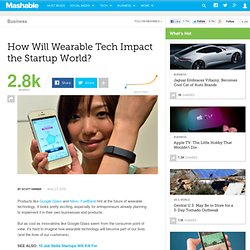
It looks pretty exciting, especially for entrepreneurs already planning to implement it in their own businesses and products. But as cool as innovations like Google Glass seem from the consumer point of view, it's hard to imagine how wearable technology will become part of our lives (and the lives of our customers). Wearable Sensor-monitoring Technology Could Change Preventative Medicine Forever. Toronto-based InteraXon CEO, Ariel Garten, took the Engadget Expand stage recently wearing a baby blue headband and as she sat she lifted up her smartphone and said “this is me, this is my brain," a fantastic start to a panel put together to look at future technology.
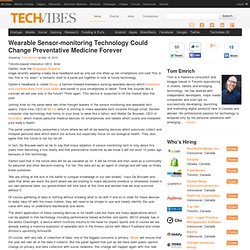
Garten’s headband is called Muse, a fashion-forward brainwave sensing wearable device which monitors and collects data from your brain and sends to your smartphone or tablet. Think this sounds like a concept we will see only in the future? Think again. This device is expected to hit the market later this year. Joining Ariel on the panel were two other thought leaders in the sensor monitoring and wearable tech space.
Using Facial-Recognition Technology to Track Down the Boston Bombers (and Why Humans Are Still Better at It) It’s still unclear exactly how law enforcement officials zeroed in on the two figures in surveillance footage suspected of carrying out the deadly bomb attack at Monday’s Boston Marathon—figures whom officials have identified as Dzhokhar and Tamerlan Tsarnaev, two young brothers from a family of Chechen immigrants.
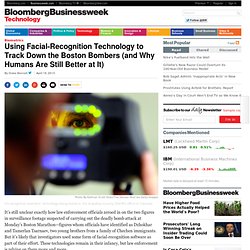
But it’s likely that investigators used some form of facial-recognition software as part of their effort. These technologies remain in their infancy, but law enforcement is relying on them more and more. The FBI is rolling out an ambitious, billion-dollar biometric information system that will include iris scans, voice recognition, and facial-recognition software, developed with Lockheed Martin (LMT), IBM (IBM), Accenture (ACN), and BAE Systems (BA/:LN), among others. Samsung And Apple To Do Battle Over Smart Watches. Le smartphone double écran YotaPhone se montre en vidéo. Jeudi dernier, Édouard nous présentait le YotaPhone, ce terminal de conception russe, tournant sous Android et dont la particularité est de disposer de deux écrans, un sur chaque face du smartphone.
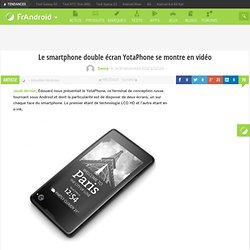
Le premier étant de technologie LCD HD et l’autre étant en e-ink. Il n’aura pas fallu attendre longtemps pour vérifier que le YotaPhone n’est peut-être pas qu’un concept obscur qui ne verra jamais le jour : Anton Tarasenko, responsable du développement logiciel chez Yota Device s’est empressé de réaliser une vidéo où il effectue une démonstration des principales fonctionnalités du YotaPhone, sur ce qui semble être un prototype en état de marche. Le Samsung Galaxy S DUOS a été annoncé. Une faille affecte les SMS sur iPhone, Apple ne se sent pas concerné. Apple v. Samsung: the cracks begin to show as closing arguments loom.
A judge's outburst.
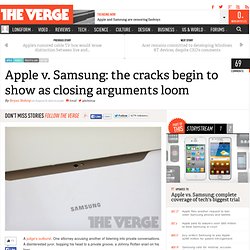
One attorney accusing another of listening into private conversations. A disinterested juror, bopping his head to a private groove, a Johnny Rotten snarl on his face Three weeks into Apple v. Samsung, the cracks are starting to show. There seem to be more attorneys in the hallways. Samsung often didn't bother with a cross-examination Something shifted earlier this week as Samsung began its case. When things move that quickly, it's hard to blame the jurors if some of them look disinterested. There's been a lack of narrative Most of all, there's been a lack of cohesion, of cause-and-effect... of narrative. Whether due to time, happenstance, or strategy, it would appear that somewhere along the line the legal teams started presenting cases for other lawyers — and, very likely, appeals courts — rather than a jury of individuals.
iPhone 5 Estimate A vs iPhone 4S Design Comparison.